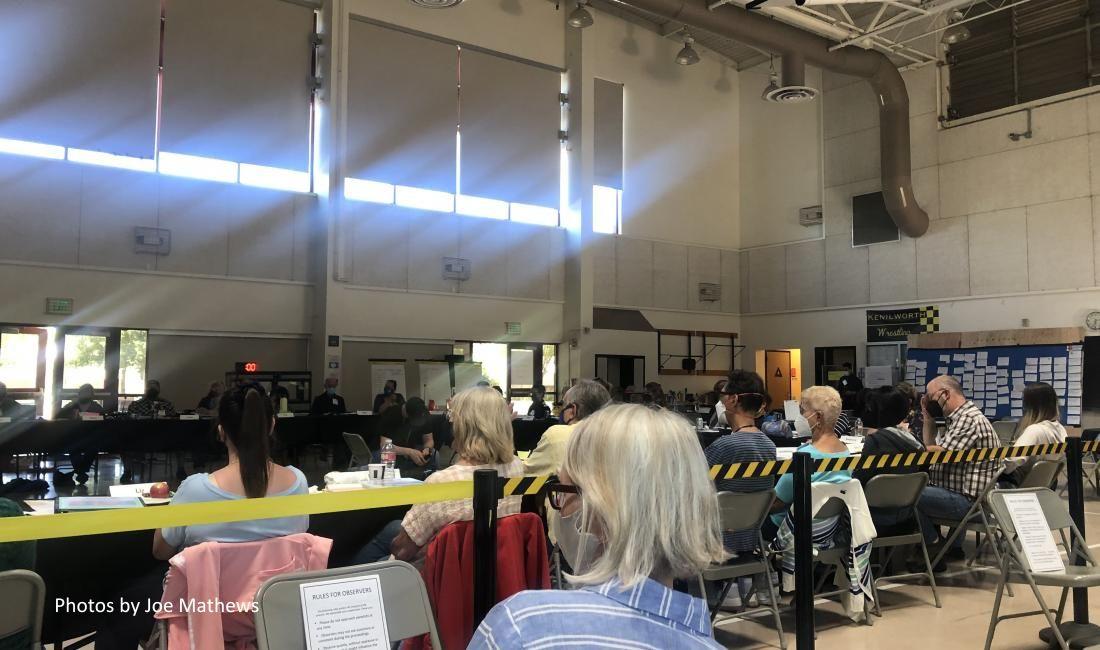Marjan Ehsassi's new book, Activated Citizenship: The Transformational Power of Citizens Assemblies, delivers more than it promises.
Photos by Joe Mathews. On Friday Sept 13, at 17.00 Central European time, 8 am Pacific time, PeoplePowered is hosting an online event, "Relearning Democracy," examining Marjan Ehsassi's book Activated Citizenship, and the book Educating for Democracy: The Case for School Participatory Budgeting You can register here.
Are you experiencing “voice insecurity”?
That novel phrase was coined by democracy scholar and practitioner Marjan Ehsassi in her newly published Activated Citizenship, the rare book that delivers more than it promises.
Voice insecurity should prove to be an effective term because it gets at the essence of what most of us mean when we express our frustrations with democracy. “Voice insecurity leaves you feeling your voice doesn’t matter. It’s a symptom of a failing representative democracy,” she writes. “You don’t see your preferences in their policies and rules.”
In the U.S., voice insecurity becomes worse when abortion rights are taken away despite huge support for reproductive freedom, or when gun ownership is largely unregulated despite enormous popular support for gun control. But the separation and divide between us and our representatives—“the continued weakening of connective tissue” between government and the governed—contribute to this insecurity as well. “No constituent staff knock on your door anymore,” she writes. “Emails are unanswered. In town halls, elected officials don’t stay long.”
“Voice insecurity” doesn’t just explain why so many are giving up on democracy. It provides a frame for fixing our democracy—by making sure that our voices, our views and preferences help shape our democratic governments. “Consequential voice,” writes Ehsassi, is what we need.
Ehsassi herself is a consequential figure in democracy circles, especially in the United States. She’s the daughter of a Persian diplomat, and a lawyer whose work on democracy promotion has taken all over the world, including to Cuba and North Korea. I met her at a citizens’ assembly in Petaluma, California two years ago.
Ehsassi is now the executive director of the newly formed Federation for Innovation in Democracy-North America, which is seeking to establish—and rigorously evaluate—deliberative assemblies of everyday people chosen by democratic lottery or sortition. Such bodies, often called citizens’ assemblies, are popular in Europe but still little seen in the U.S., Canada and Mexico.
At first glance, Ehsassi’s book, subtitled “The Transformative Power of Citizens’ Assemblies,” might appear to be just a very well-researched study of this particular democratic tool, which used lotteries and sortition to create mini-publics of everyday citizens. But Activated Citizenship goes beyond specific tools to offer a vision of “a new political ecosystem that extends beyond the ballot box and creates capacities for meaningful input by Americans of all walks of life.”
Ehsassi, drawing from her deep research of citizens’ assemblies in Canada, Belgium, France and California, gets quite specific about how to activate people so they are connected to, and have real power in democratic decision-making.
She lists five “measurable variables” for processes that seek to nurture activated citizens. The first is “epistemic growth”—do citizens learn more about the issue and the government. A second is connectedness—do they feel more connected to civic life, government, and their community? A third is whether participating in a process inspires people to engage in more political activity.
Her choice of a fourth variable is fascinating. “Effervescence,” she writes, is an important variable, because it captures the emotional dimension of participation and emphasizes citizen enthusiasm.” Why? Because, to get people to participate in the democratic process, a sense of excitement—effervescence—can be a bigger driver than civic duty. In the French climate citizens’ assembly, for example, 64 percent of participants who responded to her survey said they were motivated by excitement, and only 16 percent by duty.
The fifth and final variable is “consequential voice.” In describing that, Ehsassi makes a cautious but important point about the reasonable expectations of everyday citizens.
I’ve been among many commentators who argue that democratic processes, including assemblies, too often produce frustration because they rarely change policy. But Ehsassi says that policy change is not the only goal that participants care about. They want their voices to be heard, and to have consequences.
“Citizens generally do not expect that their input will be binding,” she writes. “By and large, they are eager to play a role—even a consultative one—as long as their work is valued by government and meaningful to decision-makers.”
Ehsassi’s book is full of fascinating insights drawn from her own rigorous evaluation of deliberative democratic processes. Small design and implementation decisions can make a big positive difference in the quality and impact of process.
In one example, she shows how having participants eat meals together, or go on excursions together, improves their deliberative work. In another, she details how processes can break down when they fail to include all participants in discussions, and or don’t provide sufficient time to answer questions. (These were problems in the Petaluma assembly she evaluated). Ehsassi also shows how such processes can most effectively bring together regular people and elected officials in deliberation.
“When you put electeds and people together, data suggests that representatives benefit from exposure to citizens as much if not more than participants being exposed to members of government,” she writes.
Another of her findings: it is better to give narrower and more specific questions for citizens assemblies and similar democratic processes to answer. While it’s a natural instinct to give deliberative bodies of cities broad mandates in their work, the hard reality is that such wide-open mandate makes the learning process more complicated, “leading to less focus and deliberation and proposals that sometimes lack impact,” she writes.
Ehsassi’s book is an extended argument for sweating the details of organizing any democratic process. Democracy advocates often want to promote a process, but Ehsassi is more interested in ensuring quality through critical evaluations, better data on such processes, rigorous enforcement of neutrality and independence among conveners and those who provide information to such processes. She also agrees with the Organization for Economic Co-operation and Development (OECD) that citizens’ assemblies should have minimum standards, including being championed by government, having three phases (learning, deliberation, and drafting of recommendations), and taking at least four days.
Good processes, she concludes, promote a moderation of extreme points of view, reduce polarization and enhance belonging and a sense of community among their participants.
In other words, people who deliberate democratically and effectively feel more secure that their voices matter and will be heard.




